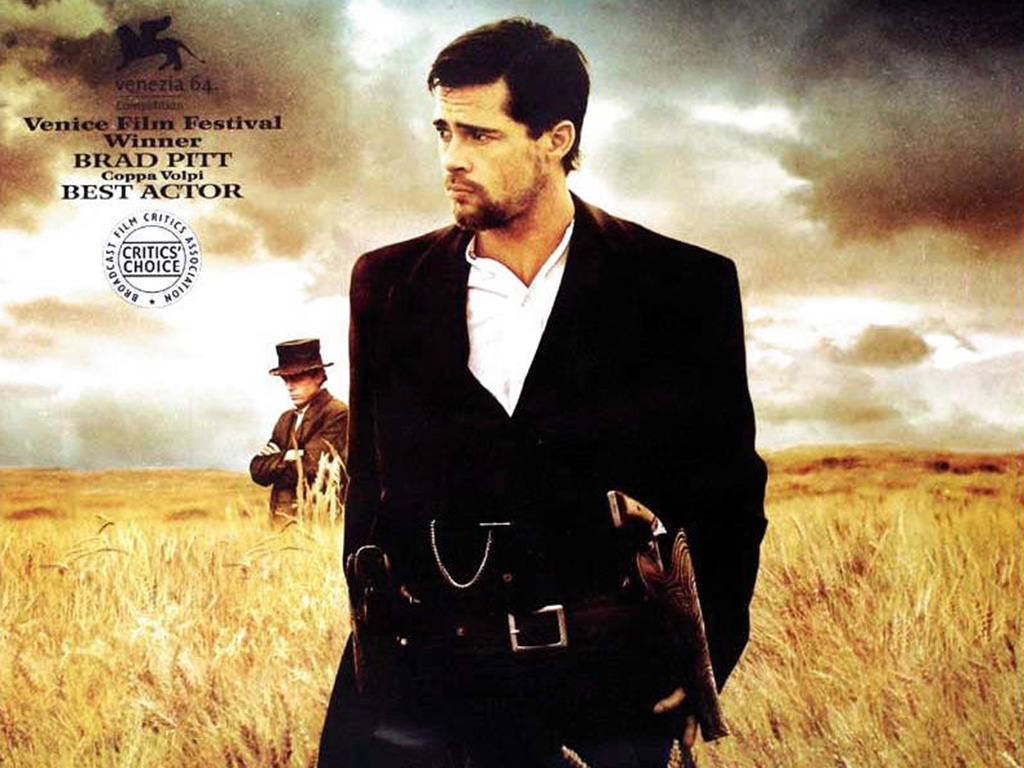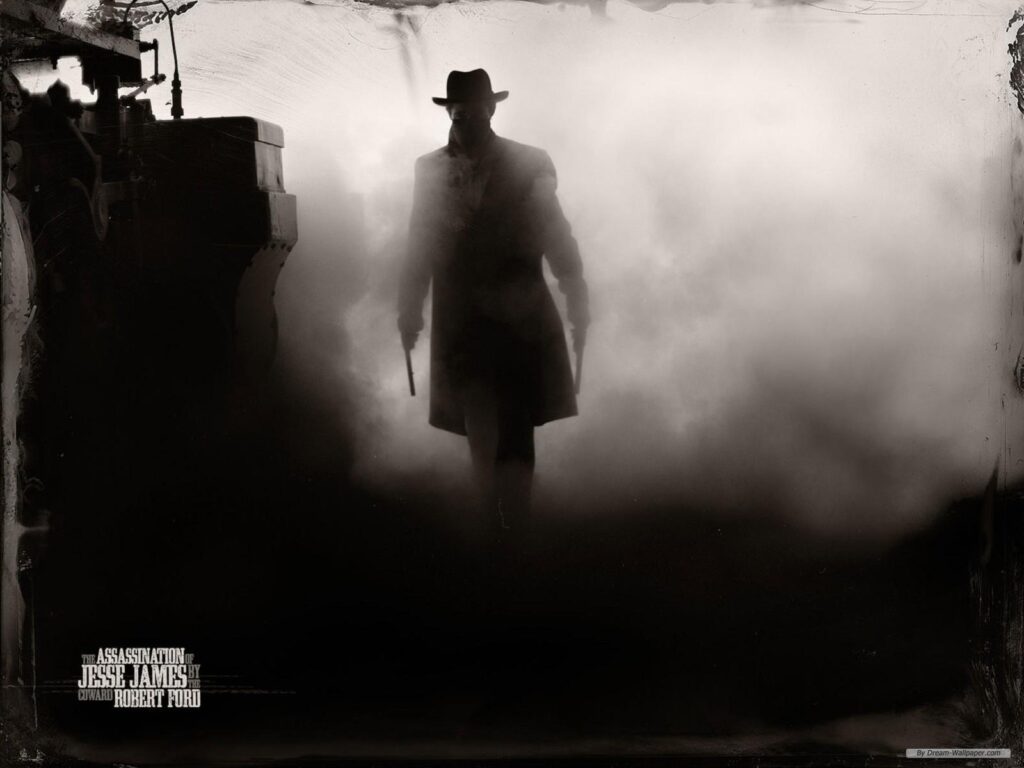
Main Cast:
- Brad Pitt as Jesse James
- Casey Affleck as Robert Ford
- Sam Rockwell as Charley Ford
- Sam Shepard as Frank James
- Mary-Louise Parker as Zee James
- Jeremy Renner as Wood Hite
- Paul Schneider as Dick Liddil
The Assassination of Jesse James by the Coward Robert Ford (2007) is a slow-burn, meditative Western that narrates the final months of the infamous American outlaw Jesse James and his complicated relationship with his eventual betrayer, Robert Ford. The film’s story is not just about the legendary killing but delves deeply into the psychology of both men, exploring themes of fame, betrayal, and obsession.
Plot Overview:
Setting the Stage:
The movie is set in 1881 when Jesse James (played by Brad Pitt) is at the height of his infamy but nearing the end of his criminal career. After years of leading his gang in bank and train robberies, Jesse has become both a legend and a fugitive, living in constant paranoia. At this point, his gang is dwindling due to arrests and deaths.
Introduction to Robert Ford:
Robert “Bob” Ford (played by Casey Affleck), a 19-year-old who has idolized Jesse James since childhood, joins the James gang through his older brother, Charley Ford (Sam Rockwell), who is already a member. Bob’s obsession with Jesse is clear from the start, but he is awkward, insecure, and desperate to be seen as someone of importance. Bob wants to be more than just a follower; he longs to be part of history, like Jesse.

The Final Robbery:
In September 1881, Jesse and the remaining members of his gang, including Bob and Charley Ford, pull off a train robbery. This marks the last successful crime of Jesse’s career, but tensions rise within the gang as paranoia sets in. Jesse becomes increasingly suspicious of those around him, knowing the law is closing in and that many of his associates are turning against him for reward money.
Jesse’s Growing Paranoia:
Over the next several months, Jesse remains on the move, hiding with different gang members. He starts to distance himself from old allies, executing those he suspects might betray him. Bob Ford, while still idolizing Jesse, begins to see cracks in the myth of the legendary outlaw. He also starts to recognize that Jesse might not trust him, and Bob’s admiration turns into envy and resentment.
Ford’s Betrayal:
By early 1882, Bob Ford has been approached by law enforcement officials, including Missouri Governor Thomas T. Crittenden, who want to capture or kill Jesse. They offer a substantial reward for Jesse’s death, and Bob agrees to betray his hero for the promise of fame and fortune.
In April 1882, Jesse invited Bob and Charley Ford to stay with him at his home in St. Joseph, Missouri. On the morning of April 3rd, Jesse prepares to leave for another robbery. Sensing something is wrong, Jesse seems to test the loyalty of Bob and Charley. At one point, Jesse removes his gun belt and turns his back to them to dust off a picture on the wall. Seeing his opportunity, Bob shoots Jesse in the back of the head with a revolver, killing him instantly.
The Aftermath:
Bob and Charley Ford are immediately hailed as heroes by some and reviled by others. Bob, in particular, dreams of becoming famous for his act, but he is instead branded as a coward and a traitor. The public, which had once celebrated Jesse’s criminal exploits, begins to romanticize him even more after his death, and Bob’s reputation suffers as a result.
Bob Ford, once obsessed with Jesse, becomes increasingly isolated and disillusioned. He eventually opens a theater show where he reenacts the assassination, but the fame he sought eludes him. The guilt of his betrayal, combined with the public’s disdain, weighs heavily on him. In 1892, ten years after killing Jesse James, Bob Ford was shot and killed by Edward O’Kelley in a saloon, a victim of the same kind of mythologizing that once made Jesse James a legend.
Themes:
- Hero Worship and Disillusionment:
Bob Ford’s intense admiration for Jesse James gradually gives way to envy and resentment as he realizes the flawed human behind the myth. The film explores how hero worship can become toxic when the gap between the legend and the reality is too wide to reconcile. - The Nature of Fame:
Both Jesse and Bob grapple with fame, albeit in different ways. Jesse’s fame makes him a target, living in constant fear of betrayal. For Bob, fame is an obsession, a way to escape his ordinary life. However, once he achieves it by killing Jesse, he finds it hollow and fleeting. - Betrayal and Guilt:
The film delves into the psychological toll of betrayal on both the betrayer and the betrayed. Jesse is constantly suspicious of those around him, knowing that betrayal could come at any moment. For Bob, the act of killing Jesse brings not the glory he sought but a deep, lasting guilt. - Myth vs. Reality:
The film underscores the tension between the myth of Jesse James and the reality of his life. While Jesse is seen as a larger-than-life figure by the public, the film presents him as a vulnerable, paranoid man. Similarly, Bob Ford’s attempt to cement his place in history as a hero backfires as the public reshapes his narrative, turning him into a coward.

Conclusion:
The Assassination of Jesse James by the Coward Robert Ford is a masterful, introspective film that presents a complex psychological portrait of two men bound together by admiration, jealousy, and betrayal. It’s not just a story about a famous outlaw’s death, but an exploration of the human desire for recognition and the inevitable fall that comes when one attempts to kill a legend. Through its stunning visuals, strong performances, and haunting score, the film cements itself as a “reel gem” in modern cinema.

